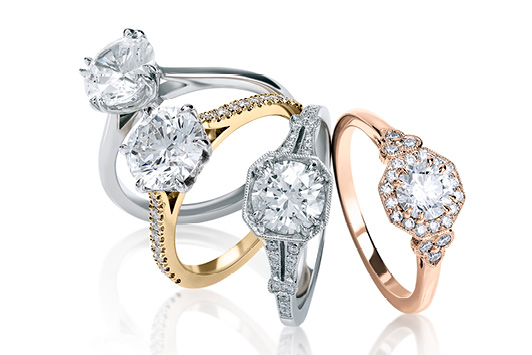
Sometimes it’s easier to stay with the status quo. But for the Rosenheim family, owners of Tiny Jewel Box in Washington, DC, doing things differently is very much in their comfort zone.
“What most jewelers did first, we did last,” explains company president Matthew Rosenheim, the third generation in the family business. “Historically, the two pillars of the jewelry business are diamonds and watches. But those are our youngest businesses.”
For the first 40 years of its almost 90-year history, the store focused on vintage. From there, the family introduced designer jewelry and giftware, then diamonds and watches. Having vintage as part of the store’s DNA still exerts a strong influence on its business, according to Rosenheim.
“We don’t want to be like everyone else,” he stresses. “We were always willing to take risks. My father, [chairman] Jim Rosenheim, bought David Yurman before he was David Yurman. When we knew something was unique, we didn’t need outside validation from the market to take that risk. Furthermore, we had the confidence to tell our customers why this jewelry was so special. That is one of the ways we continue to stay out front.”
Building importance
Physical expansions also helped propel the business forward. After he joined the store in the mid-1990s, Rosenheim recognized the need to gain more visibility outside the antique sector. The purchase of a six-story building increased the shop’s square footage from 1,500 to 15,000, enabling the owners to devote three floors to retail and another to giftware. Over the years, Tiny Jewel Box has created exclusive items for the White House (as gifts to world leaders), Congress, the Supreme Court and foreign embassies.
The transition into the larger building marked the start of a greater focus on diamonds and bridal; before, these had been only minor components. The move also coincided with the explosion of designer jewelry in the country. Tiny Jewel Box was at the forefront of that trend, according to Rosenheim, who recalls that “we got a lot of positive trade press” for the design talent the store sourced.
But it was another expansion at the end of 2015 that “totally changed our model,” he says. The company acquired a corner wraparound property, increasing its first-floor space and enabling it to move all its products to that level. In particular, it let Tiny Jewel Box establish associations with prestige watch brands, which required sufficient space to keep their separate branding images consistent within the store.
“For the independent jeweler in the US, prominent watch brands become like an anchor tenant in the mall,” says Rosenheim. “Very few global jewelry brands have widespread recognition — and most of them are retail brands such as
Tiffany & Co. and Cartier. Since our jewelry brands are not global brands, they don’t have the same cachet as a widely known watch brand. However, once a client sees you are an authorized Rolex dealer, they will make a quality judgement about your company by virtue of your association with these true global brands.”
Watches are now the store’s best sellers, with Rolex topping the list, followed by Patek Philippe. Other watch lines include Jaeger-LeCoultre, Cartier, IWC Schaffhausen, Tag Heuer and Longines.
The upper crust
Another strategic decision was to grow the higher end of the business and gradually “shave” the low end, according to Rosenheim. “You can’t be everything to everyone. We’re looking for the affluent, sophisticated customer who will appreciate old-fashioned service. We’re not the store for someone who wants a 2-carat pair of diamond earrings for $4,000, because we would have to prostitute our quality too much. And the person shopping online for the cheapest commoditized item is not our customer, and that’s okay.”
Best sellers in the jewelry category are Alex Sepkus, Marco Bicego, Temple St. Clair, Penny Preville and Paul Morelli.
Attracting new customers remains a constant focus. “The bridal business is how we regenerate our customer base, and we seek to acquire the client in the beginning of their purchasing life cycle,” explains Rosenheim.
The introduction of the Roslyn Collection has helped the store develop a robust bridal segment. The collection pays homage to Rosenheim’s grandmother, Roz, the original founder of Tiny Jewel Box back when it was, in fact, tiny: just a breezeway between two buildings. Consisting of classic silhouettes with vintage details, the Roslyn line is produced in-house and offers a full range of customization — a feature that “really appeals to today’s customer, who wants to put her own imprint on these rings,” Rosenheim notes. In fact, he reports, the rings are so popular that the store can’t keep up with production.
Tiny Jewel Box’s custom work extends to other areas of jewelry as well. Rosenheim recalls a pair of “spectacular” custom pink-diamond oval earrings. But while pink diamonds have been a distinctive choice for clients seeking something rare, he says they appeal to only a “thin slice” of his customer base. The closing of Rio Tinto’s pink-producing Argyle mine will not have a “profound” effect on business, Rosenheim believes.
Taking control
Over the course of almost a century, Tiny Jewel Box has kept to its vision of the future by understanding and directing market forces in ways that could benefit its business.
“You have to create your own artistic plan for your company,” Rosenheim advises. “You can’t worry about online business and social media reviews. Focus on what happens across the 12 inches between the staff and the customer. You need the best possible team so they can live your vision. That hasn’t changed much over the years. We have to evolve, but we can’t forget what made us successful, and that will always be relevant.”
Image: Tiny Jewel BoxArticle from the Rapaport Magazine - January 2020. To subscribe click here.